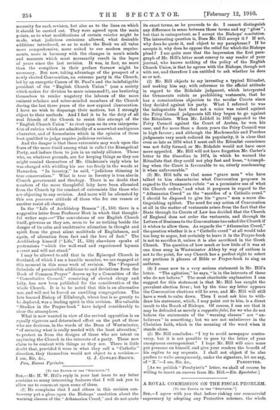[TO THE EDITOR OF TEE "SPECTATOR.')
Sin,—Mr. H. W. Hill's reply in your last issue to my letter contains so many interesting features that I will ask you to allow me to comment upon some of them.
(1) He complains that I and others in this revision con- troversy put a gloss upon the Bishops' resolution about the warning clauses of the " Athanasian Creed," and do not quote
its exact terms, as he proceeds to do. I cannot distinguish any difference in sense between those terms and my " gloss"; but that is unimportant, as I accept the Bishops' resolution. The interesting question is, Does Mr. Hill accept it P If not, why does he quote it, and object to my paraphrase P If he accepts it, why does be oppose the relief for which the Bishops plead ? I am quite sure that the impression the first para- graph of Mr. Hill's letter must convey to any reader of your journal, who knows nothing of the policy of the English Church Union, is that he agrees with the Bishops, though not with me, and therefore I am entitled to ask whether he does so or not.
(2) Mr. Hill objects to my inventing a typical Ritualist, and making him say, with reference to the official attitude in regard to the Ridsdale judgment, which interpreted the Ornaments rubric as prohibiting vestments, that he has a conscientious objection to the secular Courts since they decided against his party. What I referred to was the indisputable fact that not a voice was raised against the Privy Council judgments till they began to go against the Ritualists. When Mr. Liddell in 1857 appealed to the Privy Council against the Court of Arches, he won his case, and for more than a dozen years the Privy Council was in high favour ; and although the Mackonochie and Purchas judgments very much reduced its popularity, it is clear that even so late as 1876 what I must call the Ritualist conscience was not fully formed, or Mr. Ridsdale would not have once more appealed. Mr. Hill will not have forgotten Mr. Carter's letter to the Guardian in 1874, in which he warned the Ritualists that they could not play fast and loose, " triumph- ing when the Court is favourable to us, utterly condemning it when unfavourable."
(3) Mr. Hill tells us that some " grave men " who have talked to him characterise what Convocation proposes in regard to the Ornaments rubric " as a permissive use of what the Church orders," and what it proposes in regard to the "Athanasian Creed " as the " sacrifice of a Catholic creed." I should be disposed to give his " grave " men a more dis- tinguishing epithet. The need for any action of Convocation at all in the matter of vestments arises from the fact that the State through its Courts of Law has decided that the Church of England does not order the vestments, and through its Letters of Business to the Convocations has asked the Church if it wishes to allow them. As regards the "Athanasian Creed," the question whether it is a "Catholic creed" at all would take too long to argue, but certainly to leave it in the Prayer-book is not to sacrifice it, unless it is also sacrificed in the Greek Church. The question of how much or how little of it was at one time sung in Westminster Abbey by way of anthem is not to the point, for any Church has a perfect right to select any portions it pleases of Bible or Prayer-book to sing as anthems.
(4) I come now to a very serious statement in Mr. Hill's letter. " The agitation," he says, " is in the interests of those who do not believe." The most charitable explanation I can suggest for this statement is that Mr. Hill has caught the prevalent election fever ; but by the time my letter appears the Convocation elections will be over, and Mr. Hill will still have a week to calm down. Then I must ask him to with- draw his statement, which, I may point out to him, is a direct insult to the Bench of Bishops. Of course, I can see that it may be defended as merely a suggestio falsi, for we who do not believe the statements of the warning clauses " are " un- believers" in something ; but we are not unbelievers in the Christian faith, which is the meaning of the word when it stands alone.
(5) Mr. Hill concludes: "I try to avoid newspaper contro- versy, but it is not possible to pass by the letter of your anonymous correspondent." I hope Mr. Hill will mice more put pressure on himself, and give your readers the benefit of his replies to my requests. I shall not object if he also prefers to write anonymously, under the signature, let me say,
of " X."—I am, Sir, &c., PRESBYTER. [As we publish " Presbyter's" letter, we shall of course be
willing to insert an answer from Mr. Spectator.]










































 Previous page
Previous page